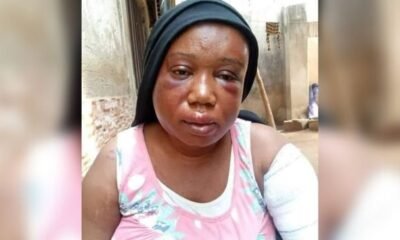News
Experts Tackle Tech-Facilitated Gender-Based Violence At Forum

JIMOH ELIZABETH OLUWASEYI.
How to tackle Tech-Facilitated Gender-Based Violence (TFGBV) was the main course of discussion at a stakeholders’ conference which held recently.
The forum which had the theme: “Think-tank Discourse and Baseline on the Context and Prevalence of Tech-Facilitated Gender-Based Violence (TFGBV): Perspectives from Nigeria, Liberia, Kenya, Togo & Cameroon,” ran through two sessions.
The first session was moderated by Lady Ejiro Umukoro while Mrs Ugonma Cokey, Vice President, JFC Nigeria; Project lead gave the opening remarks.
Setting off the programme, Dr. Sarah Macharia, Manager, Gender & Communication, WACC, gave an overview of the emerging concerns related to misogyny and Technology-facilitated gender-based violence (TFGBV).
Dr Macharia made reference to Article 19 of the Universal Declaration of Human Rights 1948, which states that- “Everyone has the right to freedom of opinion and expression; this right includes freedom to hold opinions without interference and to seek, receive and impart information and ideas through any media and regardless of frontiers.”

Rev. Gustave Ebai, WACC-AR Executive member
This helped to set the tone for discussion on the saddening issue of segregation against the female folks, manifesting in the form of lack of freedom of opinion and expression in respect to the UN special Rapporteurs.
READ ALSO: Why Students, Programmers, Etc Must Join Tech Giants Fight Commercial Spyware Vendors
Undoubtedly, the session with Dr Macharia exposed the audience to some digital rights flouted by acts of gendered cyber violence, some of which includes-
-right to access the internet,
-right to freedom of expression and association online, right to online privacy and data protection,
-right to cyber-security,
-right to network equality and non-discrimination and right not to be a victim of an automated decision among others.

Mr Lekan Otufodunrin, President, JFC Nigeria
She further elaborated on some activities related to TFGBV against women which includes but not limited to;
Gendered hate speech, Defamation, Voyeurism, Zoom bombing, Sextortion, Non-consensual sharing of intimate images, Doxing, Spying and monitoring.
The second session which focused on-The prevalent and emerging context of misogyny and TFGBV had contributions from WACC-AR members from Togo, Cameroon, Kenya and Liberia respectively.
READ ALSO: Tech Titans Help Drive Stock Gains But Wall Street Leads
Rev. Gustave Ebai, WACC-AR Executive member from Cameroon revealed how content creators are drivers that trigger TFGBV on social media.
He said content that promotes derogatory comedy leading to satire was punishable, as a law was put in place to to that effect in Cameroon just to checkmate the influence of hate speech which oftentimes promote war.
Also, some media experts at the Tech-Facilitated Gender-Based Violence forum revealed that misogyny is not just hatred for women, it is a hatred that runs deep because it involves thoughts, feelings, emotions and behavior.
The moderator for the second session-Blessing Oladunjoye, from Nigeria, elaborated on the fact that- Nigeria was deeply rooted in cultural, political and social economic factors, with specific reference to the presence of patriarchal norms and traditions where women are relegated in family and societal setting, and this as gradually metamorphosed into technological based violence as women are not encouraged to raise their voice.
She also reiterated how political conflict, women vulnerability, economic disparity and technological advancement has led to various online harassment in Nigeria.
Contributions from Mrs. Kpalla Matomkwale, WACC-AR President, Togo,Mrs. Catherine Ouma, WACC AR Executive member from Kenya, Mr George Stewart from Liberia, and
Dr Ifedolapo Ademosu helped to drive home the points raised during discussion.
Various participants in the likes of Mr Lekan Otufodunrin, President, JFC Nigeria; Secretary, WACC Africa Region (WACC-AR), Pedmia Shatu-the Executive director for “Global Initiative for Digital Inclusion and communication from Cameroon,Dr Adeola Ekine-chairperson, Nigeria Association of Women Journalists (NAWOJ), Lagos state chapter and Student from the institute of Journalism, Lagos-Jimoh Elizabeth Oluwaseyi, added worthwhile comments during the virtual session.
READ ALSO: Google Technology Leverages Samsung Galaxy S25 To Improve AI
The Eagle reports that the forum on Tech-Facilitated Gender-Based Violence was insightful seeking to find solution to a social issue hindering women from raising their voice, but rather shying away from digital platforms.
It came to a close with final votes of thanks from Mrs Funmi Falobi; JFC Gender Desk/Advocacy Initiatives.



























